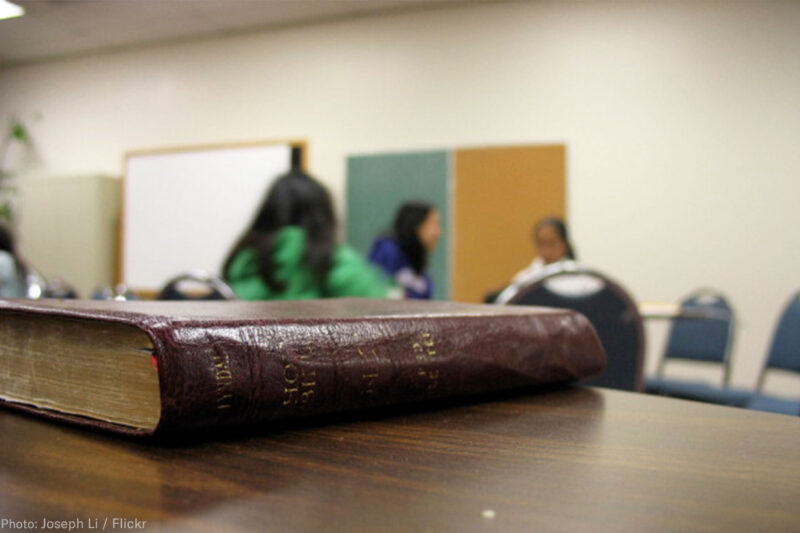
At Letcher County Central High in Whitesburg, Kentucky, students enrolled in the school’s elective Bible courses are instructed by one worksheet to “[d]o your best to build close relationships with other Christians, so that you may help one another through tough times.”
Another worksheet used in the same class asks students, “What are some promises in the Bible that God gives everyone who believes in him?”
Both curricular materials were sourced through “Teen Sunday School Place,” an online database of Sunday school lessons. Letcher County Bible course students are also encouraged to take part in religious activities, such as Bible Club.
This is flagrantly unconstitutional but, unfortunately, not surprising: While it is technically possible for a public school to offer a course focusing solely on the Bible that complies with the Constitution, it’s very difficult to actually do, even with the best of intentions. And many public schools that offer such courses purposefully use them as vehicles to proselytize students and involve them in religious activities.
It was for precisely these reasons that the ACLU of Kentucky opposed a bill last year that would formally authorize and encourage high schools to offer Bible course electives. Now that the measure has become law, the Kentucky Department of Education is developing educational standards and curricular guidance for the courses. Last week, we sent the Department a letter urging that any standards and guidance be clear and strictly hew to the Establishment Clause of the First Amendment of the U.S. Constitution.
When it comes to public school classrooms, the Constitution is clear: Proselytizing is not allowed.
As we explained in our letter, any public school course addressing the Bible must be carefully designed to avoid proselytizing or any suggestion that a religious message is being promoted by the school. It must be taught from an academic, neutral perspective. Teachers must be properly trained in how to teach the Bible from a scholarly perspective, and they must understand the legal limitations of teaching the Bible or religion courses in public schools.
Furthermore, schools or the state should monitor these courses to ensure that they are properly implemented. Based on the responses to a public-records request sent by the ACLU of Kentucky to every school district in the state, however, many Kentucky schools that currently offer Bible courses simply flout these constitutional restrictions.
In McCracken County School District, for example, students taking the school’s Bible course are instructed to turn to the Book of Philippians to learn how to treat anxiety and asked to explain how the “virtues praised by the Book of Proverbs [are] important character traits for today.” In several school districts, students are asked to memorize and recite Bible verses. And, in Letcher County, Bible course students not only receive religious worksheets, but they also watch devotional and proselytizing films, such as “God’s Not Dead 2” and “The Five People You Meet in Heaven.”
Meanwhile, one Bible class teacher in Lewis County entirely abandoned her responsibility to prepare a neutral, secular course of study. Instead of waiting for standards and guidance from the Department of Education, she read the text of the new Bible course law out loud to her students and then asked what questions they would like to address based on it. The syllabus for the course appears merely to be a list of the students’ questions, which included: “Dinosaurs and mythical creatures, what does the Bible say about them?” and “The Ark Adventure in Kentucky –can we go see it?”
I’ll save this teacher some time on the latter question: No, public schools cannot take students on field trips to evangelical amusement parks and museums, even in conjunction with a Bible literacy course. (Call us if it’s not clear why, okay? Although the ACLU lawyer in God’s Not Dead 2 wears nicer suits than we do, I promise we’re not nearly as mean or scowling as he is.)
Religious indoctrination is, of course, expected at Sunday school. But when it comes to public school classrooms, the Constitution is clear: Proselytizing is not allowed. The Kentucky Department of Education must ensure that the lines are not blurred, or school districts may face litigation.

